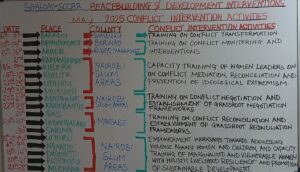
Chief Samuel Kapina in interview with SCCRR facilitator.
By Mary Koech
In Africa, chiefs have traditionally been the true representatives of their people. To date, chiefs are still carrying out administrative work in various locations across Kenya despite a new constitutional dispensation that has devolved administration to the County level. The work of a chief varies from the prevention of criminal acts, calling for the arrest of people who have committed criminal offenses, prohibiting and restricting the carrying of arms, preventing the pollution of resources like water, restricting the consumption of intoxicating liquor among other duties. Since they are easily accessible, Chiefs also listen to a lot of the disputes within their jurisdictions working together with local elders in the mediation process. They are still respected by members of the community and provide vital administrative services to the community.
The vision of Shalom is to have a society where peace, social justice and reconciliation prevail throughout Africa, and the mission is to work for a society free of physical violence and unjust social structures in Africa. The northern parts of the Kenya have experienced a lot of ethnic and clan-based conflict and even worse has for long being marginalized from the rest of the country. Armed with a clear mission and vision keeping in mind the existing structures that have been in existence for decades, Shalom always seeks to engage with the very influential local administrators at the grassroots level. Shalom identifies these key influential opinion shapers and equips them with analytical skills on what is causing local conflict and developing among them vital peace-building techniques necessary for conflict prevention and resolution.
The SCCRR team travelled to Laisamis in Marsabit County for a workshop on “Managing Identity-based Conflicts.” Laisamis is one of four Constituencies located within Marsabit County and where residents are highly dependent on livestock rearing as the dominant and rational economic enterprise. Laisamis mainly consists of pastoralist communities from the Samburu and the Rendille communities with smaller representation of other ethnic communities like the Somali, Borana, Kikuyu and Meru. This blend of cultures has its disadvantages with cattle raids perpetrated by one community against another being a prevalent feature.
Chief Samuel Kapina of Kambe location within the constituency is a man on a mission. Kapina was one of the participants at SCCRR’s recent workshop, his third time attending one. Kapina stated that the seeds of peace sowed by Shalom in previous workshops were beginning to germinate.
“Such training is very useful for me as a Chief in Kambe. Not only does it add to my knowledge but personally I am able to apply this directly in my line of work. Conflict sometimes from simple family disputes to cattle rustling, occur in my location and since I deal directly with complaints from the public, I am able to apply some strategies that I learned at the SCCRR trainings,” he said.
The Shalom workshops have provided him with the requisite knowledge allowing Chief Kapina and his colleagues to open avenues for dialogue both within and across ethnic lines. “Each conflicting individual or group should share their views and concerns so that they can live and co-exist without conflict. Before, it was very difficult to get a Borana and a Rendille sitting together in any type of forum. The relationship between the two ethnic groups was hostile. The knowledge gained has allowed us to accept the other person as a fellow Kenyan,” he added. The lessons from Shalom are also relevant within his own social domain and he pointed out how practical they are back in the villages where they can be applied. “Not only should we do this with our own ethnic community, but also with our neighbors who are from other ethnic backgrounds so that we all benefit.”
Chief Kapina believes his vision of a conflict-free Marsabit can be realised with the continued knowledge and skills received from Shalom.

